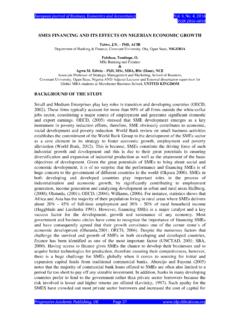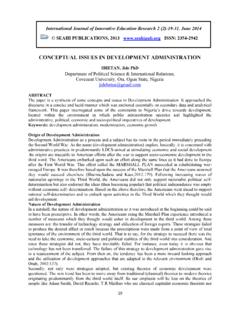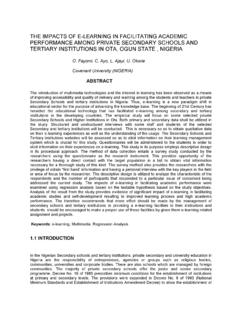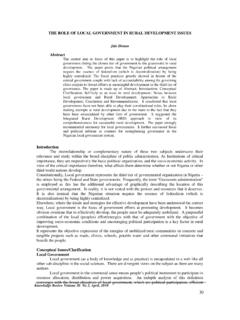Transcription of Causes and Effects Industrial crisis in Nigeria; Some ...
1 Causes AND Effects OF Industrial crisis in nigeria : SOME EMPIRICAL CLARIFICATIONS By OSABUOHIEN, Evans , , PhD [in view] Economics & Development Studies Department, College of Business and Social Sciences Covenant University, Ota, Ogun State, nigeria . Email: GSM: 08028858727; 08035826693 & Dr OGUNRINOLA, , , PhD (Senior Lecturer) Department of Economics & Development Studies, College of Business and Social Sciences Covenant University, Ota, Ogun State, nigeria . Email: 1 Causes and Effects of Industrial crisis in nigeria : Some Empirical Clarifications Abstract A harmonious workplace that guarantees satisfaction of workers and employers aspirations is very essential for enhanced productivity. But when the interest of either or both of the parties involved in Industrial relations is unsatisfied, Industrial crisis becomes imminent. Using asymmetric information and pluralistic Industrial relations theoretical framework, the study established that unions intensity, inflation rate and unemployment rate had direct influence on Industrial crisis , while wage and measure of trade liberalization had inverse impact on it.
2 The results of the econometric analysis also revealed that Industrial crisis exerts negative Effects on the level of economic activities in nigeria , denoting that Industrial crisis portends great cost to the economy as a result of reduction in productive hours. Some recommendations such as improvement of minimum wage policy of the government, reduction in inflation and unemployment rates that will help ameliorate the level of Industrial crisis , were suggested. Keywords: Asymmetric information; Industrial crisis ; Industrial relations ; Employers; Workers. JEL Codes: J28, J52, J53. INTRODUCTION. The nature of workplace in any organization both at the microeconomic level and macroeconomic platform is very crucial in determining the level at which productive activities are carried out in an economy. This is because work activities do not take place in a vacuum but within a given work-context.
3 Therefore, a sound and harmonious Industrial relations in an enterprise is essential not only to employers and workers but also to the society because efficient production of goods and services depends on it. The existence of harmonious Industrial relations will reflect efficiency and quality which depends on the level of workers motivation. Hence, interactive processes are always involved. The two parties involved in the interaction are the workers on one hand and the employer(s) on the other (Borjas)1. The employer primarily engages the workers with the belief that such an engagement will help in realizing the organizational goals. On the other hand, the workers chose to work (against pleasure) because they expect that such employment will help in fulfilling their aspirations. Thus, if any of these beliefs are not met there is reduction in expectation.
4 A harmonious workplace that ensures that the workers aspirations are considerably satisfied and the employer s expectations are relatively met is very paramount for high productivity. This is because both of them will work in ensuring that the vision of the organization is pursued with utmost dexterity (a kind of partners in progress). In other words, as workers are motivated, their morale and sense of value will be boosted which will increase their productivity, which will lead to improvement in the organizational output that will translate to the level of profitability. With 1 Borjas, G (2005) labour Economics 3rd Edition, NY: McGraw-Hill. 2multiplier s Effects the output of the economy will increase given that the total output of an economy involves the agglomeration of the various firms across the sectors.
5 Thus, meeting the workers aspirations and employers expectations, are essential conditions for Industrial peace, otherwise Industrial crisis will set in. Industrial crisis includes any form of work dissatisfaction that can manifest in several ways such as absenteeism, strike, high labour turnover, among others. It affects the immediate parties involved, which normally trickles down to the entire society especially when it occurs at a national level (Yesufu)2. Some of the Causes that have being attributed to the spate of persistent Industrial crisis in nigeria include, inter alia, poor infrastructural base in the workplace, low level of motivation, insecurity of jobs, policy inconsistencies and variance in management styles, breach of collective agreement (Dauda)3. Studies on the Causes and Effects of Industrial crisis exist in literature but there have not been sufficient empirical-econometric works to supports the issue especially in nigeria .
6 Owoye4 and Nyong5 gave insight to this quest .While the former attributed the Causes to factors like increase in cost of living, the latter assessed the Effects of a notable strike that occurred in the country. It is with this further quest for recent empirical-econometric facts that motivated this study, poised with the aim of finding out the factors that are responsible for Industrial crisis in the country in recent times and assess the extent of its Effects . It is equally aimed at providing policy information for employers as well as government. The remaining part of the study is structured as follows: next is literature review that encases the concept, Causes and Effects of Industrial crisis , followed by the theoretical framework. Methodology and analysis of data are in section IV. Conclusion is in the last section. LITERATURE REVIEW.
7 Industrial crisis Conceptualized. 2 Yesufu, (1982) An Introduction to Industrial Relation in nigeria , London: Oxford University Press. 3 Dauda, (2006) Employment of Independent Arbitrators in the Management of Trade Disputes and Industrial Crisies in nigeria , Nigerian Journal of labour Law and Industrial relations , , , 4 Owoye,O (1991) An Econometric Investigation of Strikes in nigeria ,1950-1985 , The Nigerian Journal of Economic and Social Studies, , ,Pp. 165-176. 5 Nyong, (1998) June 12 Strike Activity and Economic Development in nigeria , The Nigerian Journal of Economic and Social Studies, , , 3 Industrial crisis which entails inadequacy or absence of Industrial peace in workplace raises series of concern both to the workers and employer(s). This normally translates to the society especially when the organization involved renders essential services.
8 It is this injurious nature that any management and government strive to keep it to a bearable minimum (Borjas)6. Though it is not peculiar to developing countries, its occurrence and severity tend to be more as a result of variance in Industrial and structural factors (Tongo and Osabuohien)7. Industrial crisis include any form of work discontent which show up in several ways such as absenteeism, go-slow, loss of man-hour, high labour turnover, work to rule, picketing, strike, sabotage, walk-in and sit in, over time ban, high rate of sickness, lockout, suspension, and high incidence of query issuance (Yesufu)8. Most of them are tools in the hand of the employees while only few (lockout, suspension and issuance of query) are used by the employers for discipline and to serve as deterrent for others9. Industrial crisis could also be defined as work stoppage on the part of the employees to force their demands on the employer(s) or to resist a particular demand/rule made by the employer.
9 Kornhouser and Durbin10 defined the concept as the total range of behaviours and attitudes that express opposition and divergent orientation between individual owners and managers on one hand and the working people and their union on the other. Others have similar opinions that Industrial crisis is a state of tension when one party perceives that its expectations are being undermined by another in the work relation (Ehigie)11. Fashoyin12 puts it as enduring power struggle between workers and employers. When workers get disenchanted about their service and the organization can longer boast of the quality of workers performance, then there is the existence of emotional hazards in their interests. This situation flames Industrial crisis because each party may tend to work to undo the other as against the traditional work relation of mutual benefits.
10 Industrial crisis could 6 ibid 1 7 Tongo, and Osabuohien, (2007) Emergent and Recurrent Issues in Contemporary Industrial relations : Pathways for Converging Employment Relationships , Journal of Management and Enterprise Development, Vol. 4 (2): 41-50, 8 ibid 2 9 Emphasis is mainly on strike, which appears to be the strongest weapon used by the workers. Also it is the kind of Industrial crisis that leads to work stoppage which has a great cost to the workers and employers as well as the national economy. 10 Kornhouser,A and Durbin,R (1985) Industrial Conflict, NY: McGraw-Hill 11 Ehigie, (1998) The Role of Information and Aspiration Bargaining Power Behaviour, The Nigerian Journal of Economic and Management Studies, , Pp 74-80. 12 Fashoyin, T (1992) Industrial relations in nigeria , 2nd Edition, Ikeja: Longman Ltd.









